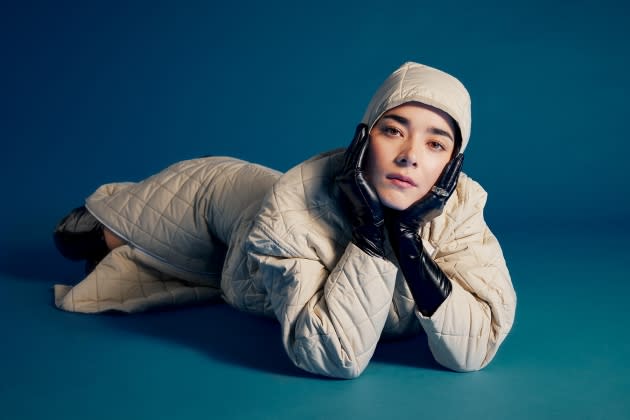Extraordinary Machine: How Miss Grit Followed the Cyborg for Their Stunning Debut

If you want to know the contours of someone’s psyche, there’s no better question to ask than “What’s your TikTok algorithm like?” Margaret Sohn, the Queens-based musician who makes futuristic alt-rock as Miss Grit, gets a lot of dog videos and food videos. But the most telling videos they keep getting recommended are the ones full of stupid, captivating home-goods gadgets.
“Usually it’s a Chinese woman coming home and using all these different devices,” Sohn says, before laughing. “This is where I’m such a sucker for capitalism sometimes. She has all these different tools that cater to her every need. Really frivolous stuff you don’t need, like a self-sanitizing trash can that removes the bag for you.”
More from Rolling Stone
In other words, it’s cyborg shit. Not exactly the same kind of cyborg shit Miss Grit explores on their excellent debut album, Follow the Cyborg (out Feb. 24 via Mute). But it’s only a long, not-very-winding road from self-sanitizing trash cans and robot vacuums designed to ease the agonies of daily existence, to sentient AI beings yearning to free themselves from the creators who designed them for that purpose.
For Sohn, 24, the classic story of a cyborg achieving awareness and freedom resonated deeply. This album came out of a time when they were starting to question various facets of their own life, from their gender to the way they thought of themselves as Korean-American. “I was allowing myself to re-write how I thought of these identities for myself,” Sohn says. “Try to figure them out on my own terms, as opposed to adopting whatever people were telling me these types of people are supposed to feel.”
Miss Grit has been Sohn’s vehicle for self-exploration since the project began in 2018, when Sohn was studying music technology at New York University. They wanted to prove to themselves they could write their own songs, lead their own band, and not just play guitar for others. The first Miss Grit EP, Talk Talk, arrived in 2019, a four-song examination of tricky relationship dynamics that garnered enough attention that Sohn started questioning their own chops. Those doubts, along with more personal ones, fueled 2021’s Impostor EP, an interrogation of the many facets of impostor syndrome that showcased Sohn’s strengthening songwriting skills and their preternatural talent for crafting killer guitar riffs and mesmerizing guitar tones.
Considering the subject matter, it’s not surprising Sohn calls Impostor a “confusing” project: “Lyrically, I wasn’t super-solid yet, and I guess there wasn’t a lot of self-confidence while writing it.” Impostor syndrome, as Sohn notes, isn’t something that just goes away, but delving into arguably deeper existential questions on Follow the Cyborg — as well as expanding their sonic palette — helped Sohn find what they’d been looking for.

One way to start is at the end, like the last stop on the 7 train in Flushing, Queens, where Sohn lives. We’re wandering around a Lunar New Year photo exhibit at Flushing Town Hall, a local arts space, in early February. Too cold for a real stroll around the neighborhood, this effectively doubles as a mini-tour as Sohn points out photos of some of the best shops and spots: the lush inside of a Korean plant store, or the storefront of a Chinese bakery, owned by a woman “who always has the most amazing make-up.”
Flushing is home to a lot of families, with bustling city streets that peel off into practically suburban ones. This is where Sohn relocated in 2022, after several years in the more traditional artists’ hub of Williamsburg, Brooklyn. An uncle — a cool one who introduced Sohn to the likes of St. Vincent and LCD Soundsytem, and took them to a punk show at the defunct DIY venue Death By Audio when they were visiting NYU — had warned that moving to deep Queens was a mistake. But Sohn’s never been happier.
“I was just sick of Brooklyn,” they admit with an easy shrug. “I’ve always loved Flushing — I think it’s my favorite place in the city.” (And not just because the rents are cheaper and the apartments bigger.)
Sohn’s move to Flushing feels like a postscript that brings Follow the Cyborg into clearer focus. The album was written, recorded, and produced in Sohn’s smaller, more expensive Williamsburg apartment during 2020 and 2021. They largely worked on Follow the Cyborg in solitude, a set-up that suits their slow-and-steady creative process and harkened back to the original dorm days of Miss Grit. A few years earlier, they’d recorded Impostor with a band in mind, but working at home on Follow the Cyborg, Sohn says, “brought me back to why I was writing music in the first place. But I could also feel all the ways I’ve changed and grown as a person and musician.”
One change was leaning more into electronic and virtual instruments, utilizing computers and audio plugins in a way they’d previously avoided: “I think studying music gave me a bit of that snobbiness, like I need to use analog gear.” Guitar — Sohn’s primary instrument, which they’ve been playing since they were six — took a backseat to synths as a songwriting tool.
“Guitar is the instrument I’ve known the longest, so I have so many habits built in,” they say. “It was getting too repetitive and restraining. I had to turn to synthesizers to make it work.”
That turned into an apt sound for an album about cyborgs, as Sohn blended digital and analog methods, machine-made sounds and those played by humans. It’s still a guitar record, with Sohn’s tricky playing and otherworldly tones feeding off the synthesizers. “I definitely kept spaces open for shredding, but I wanted to treat it like a special moment,” they say. Live drums and bass (played by indie session pro Stella Mozgawa, along with Sohn’s previous bandmates Greg Tock and Zoltan Sindhu) give the album a solid backbone, while strings, piano, and saxophone add texture and depth.

On “Nothing’s Wrong,” a languid indie-rock chug and meandering piano are woven with Tron-esque electronics and a sweeping orchestral build. “Follow the Cyborg” is brilliant dance-rock, all strobe-pulse synths, a disco beat, buzzing guitars, and a sax so cool you can hear the breath behind each note. And “Syncing,” the bittersweet closer (co-written with Pearla’s Nicole Rodriguez) builds to a subtle yet devastating apex of steady guitar strumming and drumming, synths flickering like sparklers at night, and Sohn singing, “People change twice a year/And I’m afraid I’m nowhere near where you’ll be when we sync up.”
For Sohn, the pandemic was a time of deep self-reflection and recalibration, coming off that perennially confusing period of life: the early twenties. By 2019, Sohn had been out of school for about a year on a leave of absence. They were making music, trying to figure out how to use their time effectively, doubting themselves creatively, pushing themselves creatively, and working odd jobs to make it all possible — dog walker, restaurants, retail. But the easiest cash came from the most soul-sucking job: modeling.
Sohn modeled for about three years, 2017 to 2020. It was “a crazy, fun experience,” they admit, rare and glamorous. But the damage the job was doing was also clear.
“These people are hiring you to be their model, so you’re adapting to how they want you, as a body, to emote,” they say. “It was not good for me, especially at a time where I was figuring out my gender and how I wanted to present myself to the world. Then I would go to these photo shoots for, like, Aerie or American Eagle and wear these super-feminine, frilly outfits. It was a mindfuck. It was not worth the money, and I needed to take time to figure myself out.”
Along with their gender, Sohn was trying to parse their Korean-American upbringing. Feelings lingered from their childhood in Grosse Pointe, Michigan, a “super-white, super-conservative” Detroit suburb. “Being Asian was such a big thing for my identity because it’s how the outside world viewed me,” Sohn says. Those feelings were compounded with the rise in anti-Asian violence during the pandemic, especially the March 2021 Atlanta spa shootings, which brought on further questions and confusion.
“These were all different pieces of my identity that were at my core,” Sohn says, “but I felt like I didn’t have any type of ownership over them. It was like other people would tell me how to feel about these identities.”
To navigate it all, Sohn followed the cyborg. They drew that phrase from a 2019 essay by author Jia Tolentino, “Always Be Optimizing,” about how the athleisure/exercise-class/fast-casual-salad/social-media-industrial complexes have shaped notions of the ideal woman in a late-capitalist, deeply patriarchal society (especially pre-pandemic, but still). At the end of the piece, Tolentino cites Donna Haraway’s classic 1985 essay “A Cyborg Manifesto,” and the way Haraway imagined a world where women “could be like cyborgs — shaped in an image we didn’t choose for ourselves, and disloyal and disobedient as a result.” Drawing on Haraway, Tolentino suggests the way out of this world of unrealistic, unhealthy demands is to “follow the cyborg. We have to be willing to be disloyal, to undermine. The cyborg is powerful because she grasps the potential in her own artificiality.”
Reading Tolentino’s essay illuminated something in the cyborg movies Sohn loved, like Spike Jonze’s Her, Mamoru Oshii’s Ghost in the Shell, and Alex Garland’s Ex Machina. It was definitely that journey towards autonomy and liberation from their creator, but also the calculated way the cyborg came to embrace and exercise their own free will.
“[They’re] looked down on for being emotionless, but I think being emotionless served them well,” Sohn says. “It gave them the ability to see themselves clearly, understand their position in the world, and how they can navigate and get what they want. Decide their own destiny.”
The first song Sohn wrote for Follow the Cyborg, “Like You,” catches that pivotal moment of newfound awareness and self-determination, all battering-ram bass, heroic guitar soloing, and a clear-eyed refrain: “Bore new/Everything is see-through/Confused/They might see they’re like you.”
For Sohn, identity is double-edged. Thinking deeply about it helped them “unlearn” a lot of what they learned growing up; but sometimes thinking about identity too deeply “gets not so fun and it starts to really weigh on me. It’s just hard to function as a person when you think about it too much.”
Finding the right balance involved thinking of identity not as something static, “like a ball and chain,” but something “much more fluid than that,” Sohn says. “It’s going to change as you change and your environment changes. I’m seeing that as I’m growing, and that’s why identity is maybe something that shouldn’t always be at the forefront of how you see yourself as a person, because it’s always changing as time goes on.”
Production Credits
Styling by Malu Registre. Hair and makeup by Nicolette Gold.
Best of Rolling Stone

